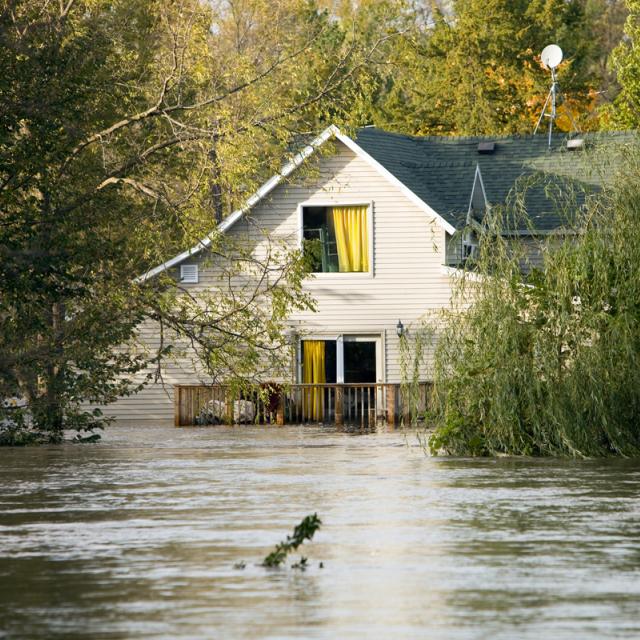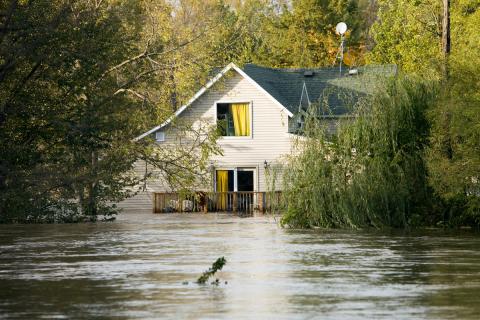Flooding in Quebec: What Does Your Promutuel Home Insurance Cover?

Did you know that floods are the most common and costly natural disaster in Canada, according to Public Safety Canada? While flooding can happen anywhere in the country and at any time of year, certain areas, such as the Ottawa-Gatineau region, are more at risk. What’s more, Public Safety Canada predicts that flooding will worsen in the coming years as a result of climate change.
To be ready for this reality, it’s smart to be well prepared. Here are some tips on how to protect your home and limit the damage flooding can cause.
Understanding flood risk
Anticipating the risks to your home is the first step in taking appropriate preventive measures to protect your property from damage. It’s important to understand that flooding can occur as much as several hundred metres from a river or stream. Floods can be caused by a variety of events, including:
- Rapid spring snowmelt
- Heavy and prolonged rainfall
- Ice jams
- Dam breaks
- River or stream flooding (excluding damage from storm surges or tidal waves)
Some areas are more prone to flooding than others. Promutuel Insurance’s decision on whether or not to insure your house against flooding will depend, among other things, on the probability of such a disaster occurring. In the event of a flood, people who are ineligible for flood insurance may have access to the Ministère de la sécurité publique's General Financial Assistance Program Regarding Disasters.
7 preventive measures to protect your home from flooding
Flooding can have devastating consequences. That’s why prevention is vital to make your home less vulnerable and reduce the potential for damage. Here are some practical steps you can take to make your home more resistant to flooding and other types of water damage:
1. Install a check valve: A check valve will prevent sewage from backing up into your basement from the sewer line.
2. Maintain gutters: Leaves and dirt can clog your gutters and allow water to accumulate. It’s essential to clean them regularly, especially when the weather calls for heavy rain or a thaw.
3. Ensure good exterior drainage: Water should flow away from the foundation of your home. Be sure to maintain a proper slope on your property to prevent standing water from seeping into your home.
4. Seal foundation cracks: Frequent inspection of your home’s foundation, windows and window wells will help prevent water seepage. If necessary, close up any openings that may allow moisture to get in.
5. Install a sump pump with battery backup: A sump pump will help prevent water from accumulating in your basement. In the event of a power failure, you’ll need a backup battery to ensure the pump keeps working.
6. Raise appliances and objects of value: Keep them safe by placing them on shelves or raising them off the floor. It is also recommended to store pollutants at heights. If you live in a flood-prone area, you may also want to consider securing your home’s electrical system.
7. Draw up an emergency plan: Draw up an emergency plan and share it with the other members of your household. Do an evacuation drill so your family knows how to act quickly. Also, leave an emergency kit in an easily accessible elevated location.
For more information on what to do in the event of a flood, see the Canadian Red Cross recommendations.
Flood insurance-your best protection
Even with all these precautions, flooding can still occur. That’s why an insurance policy tailored to your needs is a must for protecting you in case disaster strikes.
Did you know that basic home insurance doesn’t usually cover flood damage? To ensure you have flood protection, you need to add additional coverage (an endorsement) to your policy. Contact your property and casualty insurance representative to discuss your eligibility for this coverage.
Some types of water damage, including sanitary sewer leaks and overflows, are automatically covered by basic home insurance. Other types of damage, such as sewer backups and leaky roofs, are only covered if you added the necessary endorsements to your contract. That’s why it’s so important to understand what’s covered by your basic home insurance policy, and what requires additional coverage in the form of an endorsement. If in doubt, contact your property and casualty insurance representative!
Promutuel Insurance, THERE to look out for your home!
Flooding can cause significant property damage, but proper preparation can help. By taking preventive action and making sure you have flood coverage, you can protect what really matters-your family and your home.
At Promutuel Insurance, we’ve been protecting the property of our insured members for over 170 years. We’re THERE to help you choose the best coverage for your situation and needs. For home insurance that meets your needs at a fair price, ask for a quick online quote today.
Want to learn more about insurance and loss prevention? Check out our blog for a wealth of useful information. And if you have any specific questions about flood insurance, please don’t hesitate to contact a Promutuel Insurance damage insurance representative!




